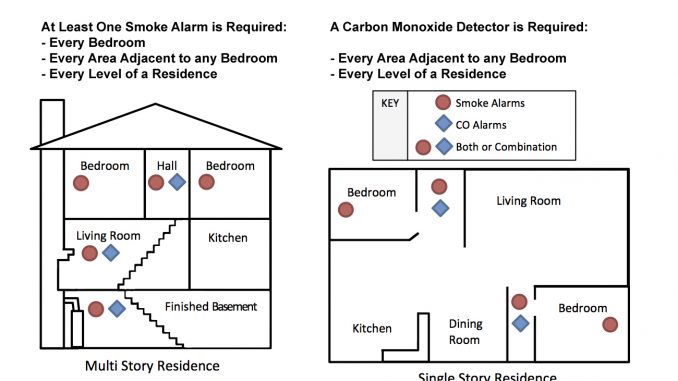
In the U.S. an average of 8 people die each day in house fires. Due to changes in law, since 1980 the number of deaths have been cut in half. Smoke detectors save lives and are an inexpensive investment.
Each of our home inspectors verifies the presence of smoke detectors (and carbon monoxide detectors) during a home inspection. If you are buying or selling a home, then smoke detectors are now required in each sleeping room, in the area immediately adjacent to a bedroom door, and on each level in the common areas.
A brief history of Smoke Detector Requirements in California:
- 1973 – One smoke alarm required for the whole home.
- 1979 – Retroactive requirements of smoke alarm inspection, hard wired, and interconnected alarms when there is any work exceeding $1,000 done on the home.
- 1988 – One smoke alarm required on every floor of the home.
- 1991 – One smoke alarm required in every sleeping room.
- 2003 – One smoke alarm required in the vicinity outside every bedroom.
- 2014 – All newly installed battery operated smoke alarms without AC power must contain a sealed battery rated to last 10 years. Landlords are responsible for checking and update smoke detectors, and cannot require tenants to check or maintain.
- 2015 – All smoke detectors must be installed pursuant to manufacturers’ instructions. All old smoke detectors which run exclusively on batteries must be replaced with new smoke detectors equipped with sealed batteries rated to last 10 years. A label is required showing the date of installation and manufacturer. All smoke alarms required for any dwelling unit must be devices approved and listed by the Office of the State Fire Marshal pursuant to Health and Safety Code Section 13114.
A requirement of new construction or remodel is that smoke alarms must now have interconnected wiring. If no construction or renovations are taking place, then the smoke alarms do not have to be interconnected. But, if a smoke detector runs only on a battery, then the battery must have a 10-year service life.
Here is a link for more information on the new law from the State Fire Marshall.
